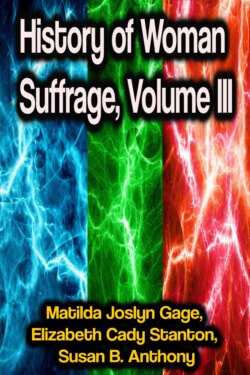Читать книгу History of Woman Suffrage, Volume III - Susan B. Anthony, Elizabeth Cady Stanton - Страница 12
На сайте Литреса книга снята с продажи.
ОглавлениеThe closing scenes of the evening were artistic and interesting. The platform was tastefully decked with flags and flowers, and the immense audience that had assembled at an early hour—hundreds unable to gain admission—made this the crowning session of the convention. Miss Couzins announced the receipt of an invitation from Mr. John Wahl, inviting the convention to visit the Merchants' Exchange, "with assurances of high regard." The announcement was heard with considerable merriment by those who remembered her criticisms on Mr. Wahl for his failure to deliver the address of welcome at the opening of the convention. She also announced the receipt of an invitation from Secretary Kalb to visit the fair-grounds, and moved that the convention first visit the Exchange and then proceed to the fair-grounds in carriages, the members of the Merchants' Exchange, of course paying the bill. The motion was carried amidst applause. An invitation was also received from Dr. Eliot, chancellor of Washington University, to attend the art lecture of Miss Schoonmaker at the Mary Institute, Monday evening. In a letter to the editor of the National Citizen, Mrs. Stanton thus describes the incident of the evening:
The delegates from the different States, through May Wright Thompson of Indianapolis, presented Miss Anthony with two baskets of exquisite flowers. She referred in the most happy way to Miss Anthony's untiring devotion to all the unpopular reforms through years of pitiless persecution, and thanked her in behalf of the young womanhood of the nation, that their path had been made smoother by her brave life. Miss Anthony was so overcome with the delicate compliments and the fragrant flowers at her feet, that for a few moments she could find no words to express her appreciation of the unexpected acknowledgement of what all American women owe her. As she stood before that hushed audience, her silence was more eloquent than words, for her emotion was shared by all. With an effort she at last said:
Friends, I have no words to express my gratitude for this marked attention. I have so long been the target for criticism and ridicule, I am so unused to praise, that I stand before you surprised and disarmed. If any one had come to this platform and abused all womankind, called me hard names, ridiculed our arguments or denied the justice of our demands, I could with readiness and confidence have rushed to the defence, but I cannot make any appropriate reply for this offering of eloquent words and flowers, and I shall not attempt it.
Being advertised as the speaker of the evening, she at once began her address, and as she stood there and made an argument worthy a senator of the United States, I recalled the infinite patience with which, for upwards of thirty years, she had labored for temperance, anti-slavery and woman suffrage, with a faithfulness worthy the martyrs in the early days of the Christian church, and said to myself, verily the world now as ever crucifies its saviors.
Thanks to the untiring industry of Mrs. Minor and Miss Couzins, the convention was in every way a success, morally, financially, in crowded audiences, and in the fair, respectful and complimentary tone of the press. Looking over the proceedings and resolutions, the thought struck me that the National Association is the only organization that has steadily maintained the doctrine of federal power against State rights. The great truths set forth in the fourteenth and fifteenth amendments of United States supremacy, so clearly seen by us, seem to be vague and dim to our leading statesmen and lawyers if we may judge by their speeches and decisions. Your superb speech on State rights should be published in tract form and scattered over this entire nation. How can we ever have a homogeneous government so long as universal principles are bounded by State lines.
The delegates remaining in the city went on Change in a body at 12 o'clock Saturday, on invitation of the president, John Wahl. They were courteously received and speeches were made by Mesdames Couzins, Stanton, Anthony, Meriwether and Thompson. Mrs. Meriwether's speech was immediately telegraphed in full to Memphis. All wore badges of silk on which in gold letters appeared "N. W. S. A., May 10, 1879, Merchants' Exchange." From the Exchange the ladies proceeded in carriages to the fair-grounds, and Zoölogical Gardens where they took refreshments.
On Saturday evening Miss Couzins gave a delightful reception. Her parlors were crowded until a late hour, where the friends of woman suffrage had an opportunity to use their influence socially in converting many distinguished guests. On Sunday night Mrs. Stanton was invited by the Rev. Ross C. Houghton to occupy his pulpit in the Union Methodist church, the largest in the city of that denomination. She preached from the text in Genesis i., 27, 28. The sermon was published in the St. Louis Globe the next morning.[51] Mrs. Thompson was also invited to occupy a Presbyterian pulpit, but imperative duties compelled her to leave the city.
The enthusiasm aroused by the convention in woman's enfranchisement was encouraging to those who had so long and earnestly labored in this cause.[52] This was indeed a week of profitable work. With arguments and appeals to man's reason and sense of justice on the platform, to his religious emotions and conscience in the pulpit, to his honor and courtesy in the parlor, all the varied influences of public and private life were exerted with marked effect; while the press on the wings of the wind carried the glad tidings of a new gospel for woman to every town and hamlet in the State.
